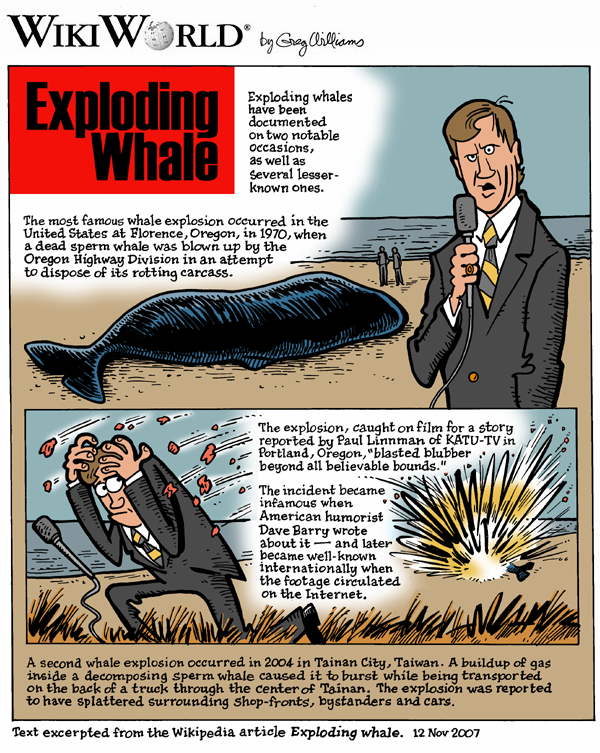One of my favorite authors is James Thurber. I frequently think of this particular piece, in which he discusses, among other things, the psycho-sexual reasons why some squirrels, when they see a car approaching, will run away, some will stand in the middle of the road and dither about, and some will jump at the car. I realize that the squirrel bit is a small part of the whole essay, but for some reason I think of it every time I see a squirrel in the road.
By the way, as far as I can tell, none of his drawings accompanied this essay, but I've included several unrelated ones here, just because I like them.
With the disappearance of the gas mantle and the advent of the short circuit, man's tranquility began to be threatened by everything he put his hand on. Many people believe that it was a sad day indeed when Benjamin Franklin tied that key to a kite string and flew the kite in a thunderstorm; other people believe that if it hadn't been Franklin, it would have been someone else. As, of course, it was in the case of the harnessing of steam and the invention of the gas engine. At any rate, it has come about that so-called civilized man finds himself today surrounded by the myriad mechanical devices of a technological world.
Writers of books on how to control your nerves, how to conquer fear, how to cultivate calm, how to be happy in spite of everything, are of several minds as regards the relation of man and the machine. Some of them are prone to believe that the mind and body, if properly disciplined, can get the upper hand of this mechanized existence. Others merely ignore the situation and go on to the profitable writing of more facile chapters of inspiration. Still others attribute the whole menace of the machine to sex, and so confuse the average reader that he cannot always be certain whether he has been knocked down by an automobile or is merely in love.

Dr. Bisch, the Be-Glad-You're-Neurotic man, has a remarkable chapter which deals, in part, with man, sex, and the machine. He examines the case of three hypothetical men who start across a street on a red light and get in the way of an oncoming automobile. A dodges successfully; B stands still, "accepting the situation with calm and resignation," thus becoming one of my favorite heroes in modern belles-lettres; and C hesitates, wavers, jumps backward and forward, and finally runs head on into the car. To lead you through Dr. Bisch's complete analysis of what was wrong with B and C would occupy your whole day. He mentions what the McDougal-lians would say ("Instinct!"), what the Freudians would retort ("Complexes!"), and what the behaviorists would shout ("Conditioned reflexes!"). He also brings in what the physiologist would say deficient thyroid, hypoadrenal functioning, and so on. The average sedentary man of our time who is at all suggestible must emerge from this chapter believing that his chances of surviving a combination of instinct, complexes, reflexes, glands, sex, and present-day traffic conditions are about equal to those of a one-legged blind man trying to get out of a labyrinth.
Let us single out what Dr. Bisch thinks the Freudians would say about poor Mr. C, who ran right into the car. He writes, " 'sex hunger,' the Freudians would declare. 'Always keyed up and irritable because of it. Undoubtedly suffers from insomnia and when he does sleep his dream life must be productive, distorted, and possibly frightening. Automobile unquestionably has sex significance for him ... to C the car is both enticing and menacing at one and the same time. ... A thorough analysis is indicated. ... It might take months. But then, the man needs an analysis as much as food. He is heading for a complete nervous collapse.' " It is my studied opinion, not to put too fine a point on it, that Mr. C is heading for a good mangling, and that if he gets away with only a nervous collapse, it will be a miracle.

I have not always, I am sorry to say, been able to go the whole way with the Freudians, or even a very considerable distance. Even though, as Dr. Bisch says, "One must admit that the Freudians have had the best of it thus far. At least they have received the most publicity." It is in matters like their analysis of men and machines, of Mr. C and the automobile, that the Freudians and I part company. Of course, the analysis above is simply Dr. Bisch's idea of what the Freudians would say, but I think he has got it down pretty well. Dr. Bisch himself leans toward the Freudian analysis of Mr. C, for he says in this same chapter, "An automobile bearing down upon you may be a sex symbol at that, you know, especially if you dream it." It is my contention, of course, that even if you dream it, it is probably not a sex symbol, but merely an automobile bearing down upon you. And if it bears down upon you in real life, I am sure it is an automobile. I have seen the same behavior that characterized Mr. C displayed by a squirrel (Mr. S) that lives in the grounds of my house in the country. He is a fairly tame squirrel, happily mated and not sex-hungry, if I am any judge, but nevertheless he frequently runs out toward my automobile when I start down the driveway, and then hesitates, wavers, jumps forward and backward, and occasionally would run right into the car except that he is awfully fast on his feet and that I always hurriedly put on the brakes of the 1935 V-8 Sex Symbol that I drive.
I have seen this same behavior in the case of rabbits (notoriously uninfluenced by any sex symbols save those of other rabbits), dogs, pigeons, a doe, a young hawk (which flew at my car), a blue heron that I encountered on a country road in Vermont, and once, near Paul Smith's in the Adirondacks, a fox. They all acted exactly like Mr. C. The hawk, unhappily, was killed. All the others escaped with nothing worse, I suppose, than a complete nervous collapse. Although I cannot claim to have been conversant with the private life and the secret compulsions, the psycho-neuroses and the glandular activities of all these animals, it is nevertheless my confident and unswervable belief that there was nothing at all the matter with any one of them. Like Mr. C, they suddenly saw a car swiftly bearing down upon them, got excited, and lost their heads. I do not believe, you see, there was anything the matter with Mr. C, either.

But I do believe that, after a thorough analysis lasting months, with a lot of harping on the incident of the automobile, something might very well come to be the matter with him. He might even get to suffering from the delusion that he believes automobiles are sex symbols.
It seems to me worthy of note that Dr. Bisch, in reciting the reactions of three persons in the face of an oncoming car, selected three men. What would have happened had they been Mrs. A, Mrs. B, and Mrs. C? You know as well as I do: all three of them would have hesitated, wavered, jumped forward and backward, and finally run head on into the car if some man hadn't grabbed them. (I used to know a motorist who, every time he approached a woman standing on a curb preparing to cross the street, shouted, "Hold it, stupid!") It is not too much to say that, with a car bearing down upon them, ninety-five women out of a hundred would act like Mr. C or Mr. S, the squirrel, or Mr. F, the fox. But it is certainly too much to say that ninety-five out of every hundred women look upon an automobile as a sex symbol. For one thing, Dr. Bisch points out that the automobile serves as a sex symbol because of the "mechanical principle involved." But only one woman in a thousand really knows anything about the mechanical principle involved in an automobile. And yet, as I have said, ninety-five out of a hundred would hesitate, waver, and jump, just as Mr. C did. I think we have the Freudians here. If we haven't proved our case with rabbits and a blue heron, we have certainly proved it with women.

To my notion, the effect of the automobile and of other mechanical contrivances on the state of our nerves, minds, and spirits is a problem which the popular psychologists whom I have dealt with know very little about. The sexual explanation of the relationship of man and the machine is not good enough. To arrive at the real explanation, we have to begin very far back, as far back as Franklin and the kite, or at least as far back as a certain man and woman who appear in a book of stories written more than sixty years ago by Max Adeler. One story in this book tells about a housewife who bought a combination ironing board and card table, which some New England genius had thought up in his spare time. The husband, coming home to find the devilish contraption in the parlor, was appalled. "What is that thing?" he demanded. His wife explained that it was a card table, but that if you pressed a button underneath, it would become an ironing board. Whereupon she pushed the button and the table leaped a foot into the air, extended itself, and became an ironing board. The story goes on to tell how the thing finally became so finely sensitized that it would change back and forth if you merely touched it you didn't have to push the button.
The husband stuck it in the attic (after it had leaped up and struck him a couple of times while he was playing euchre), and on windy nights it could be heard flopping and banging around, changing from a card table to an ironing board and back. The story serves as one example of our dread heritage of annoyance, shock, and terror arising out of the nature of mechanical contrivances per se. The mechanical principle involved in this damnable invention had, I believe, no relationship to sex whatsoever. There are certain analysts who see sex in anything, even a leaping ironing board, but I think we can ignore these scientists.
No man (to go on) who has wrestled with a self-adjusting card table can ever be quite the man he once was. If he arrives at the state where he hesitates, wavers, and jumps at every mechanical device he encounters, it is not, I submit, because he recognizes the enticements of sex in the device, but only because he recognizes the menace of the machine as such.
There might very well be, in every descendant of the man we have been discussing, an inherited desire to jump at, and conquer, mechanical devices before they have a chance to turn into something twice as big and twice as menacing. It is not reasonable to expect that his children and their children will have entirely escaped the stigma of such traumata. I myself will never be the man I once was-, nor will my descendants probably ever amount to much, because of a certain experience I had with an automobile.
I had gone out to the barn of my country place, a barn which was used both as a garage and a kennel, to quiet some large black poodles. It was 1 A.M. of a pitch-dark night in winter and the poodles had apparently been terrified by some kind of a prowler, a tramp, a turtle, or perhaps a fiend of some sort. Both my poodles and myself believed, at the time, in fiends, and still do. Fiends who materialize out of nothing and nowhere, like winged pigweed or Russian thistle. I had quite a time quieting the dogs, because their panic spread to me and mine spread back to them again, in a kind of vicious circle. Finally, a hush as ominous as their uproar fell upon them, but they kept looking over their shoulders, in a kind of apprehensive way. "There's nothing to be afraid of," I told them as firmly as I could, and just at that moment the klaxon of my car, which was just behind me, began to shriek. Everybody has heard a klaxon on a car suddenly begin to sound; I understand it is a short circuit that causes it. But very few people have heard one scream behind them while they were quieting six or eight poodles in the middle of the night in an old barn. I jump now whenever I hear a klaxon, even the klaxon on my own car when I push the button intentionally.

The experience has left its mark. Everybody, from the day of the jumping card table to the day of the screaming klaxon, has had similar shocks. You can see the result, entirely unsuperinduced by sex, in the strained faces and muttering lips of people who pass you on the streets of great highly mechanized cities. There goes a man who picked up one of those trick matchboxes that whir in your hands; there goes a woman who tried to change a fuse without turning off the current; and yonder toddles an ancient who cranked an old Reo with the spark advanced. Every person carries in his consciousness the old scar, or the fresh wound, of some harrowing misadventure with a contraption of some sort. I know people who would not deposit a nickel and a dime in a cigarette-vending machine and push the lever even if a diamond necklace came out. I know dozens who would not climb into an airplane even if it didn't move off the ground. In none of these people have I discerned what I would call a neurosis, an "exaggerated" fear; I have discerned only a natural caution in a world made up of gadgets that whir and whine and whiz and shriek and sometimes explode.
I should like to end with the case history of a friend of mine in Ohio named Harvey Lake. When he was only nineteen, the steering bar of an old electric runabout broke off in his hand, causing the machine to carry him through a fence and into the grounds of the Columbus School for Girls. He developed a fear of automobiles, trains, and every other kind of vehicle that was not pulled by a horse. Now, the psychologists would call this a complex and represent the fear as abnormal, but I see it as a purely reasonable apprehension. If Harvey Lake had, because he was catapulted into the grounds of the Columbus School for Girls, developed a fear of girls, I would call that a complex; but 1 don't call his normal fear of machines a complex. Harvey Lake never in his life got into a plane {he died from a fall from a porch), but I do not regard that as neurotic, either, but only sensible.

I have, to be sure, encountered men with complexes. There was, for example, Marvin Belt. He had a complex about airplanes that was quite interesting. He was not afraid of machinery, or of high places, or of crashes. He was simply afraid that the pilot of any plane he got into might lose his mind. "I imagine myself high over Montana," he once said to me, "in a huge, perfectly safe tri-motored plane. Several of the passengers are dozing, others are reading, but I am keeping my eyes glued on the door to the cockpit. Suddenly the pilot steps out of it, a wild light in his eyes, and in a falsetto like that of a little girl he says to me, 'Conductor, will you please let me off at One-Hundred-and-Twenty-fifth Street?' " "But," I said to Belt, "even if the pilot does go crazy, there is still the co-pilot." "No, there isn't," said Belt. "The pilot has hit the co-pilot over the head with something and killed him." Yes, the psychoanalysts can have Marvin Belt. But they can't have Harvey Lake, or Mr. C, or Mr. S, or Mr. F, or k while I have my strength, me.
 when you hear Louis XVI
when you hear Louis XVI (wiki) mentioned:
(wiki) mentioned: *:
*:%2C_rev%C3%AAtu_du_grand_costume_royal_en_1779_-_Google_Art_Project.jpg/220px-Antoine-Fran%C3%A7ois_Callet_-_Louis_XVI%2C_roi_de_France_et_de_Navarre_(1754-1793)%2C_rev%C3%AAtu_du_grand_costume_royal_en_1779_-_Google_Art_Project.jpg)











